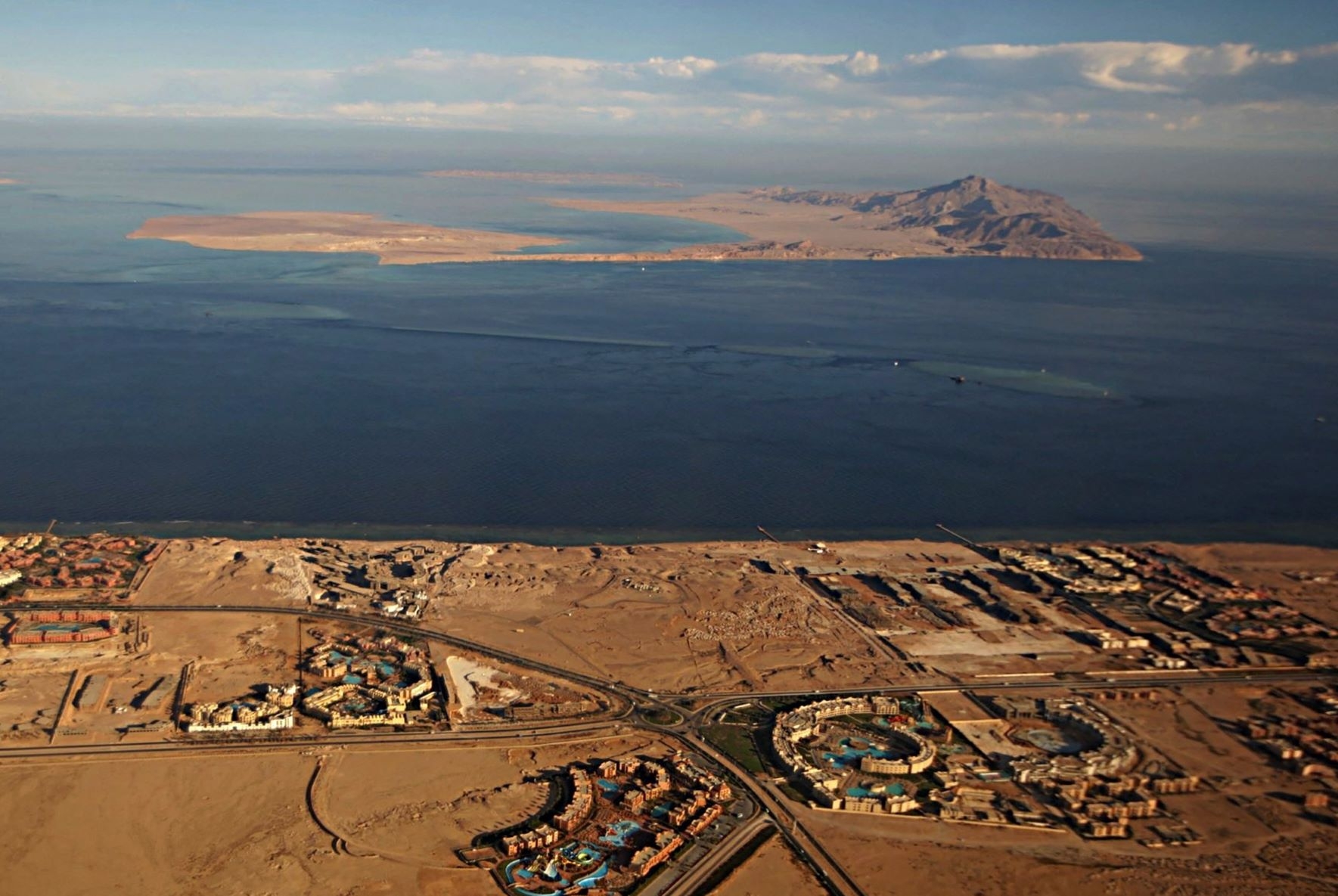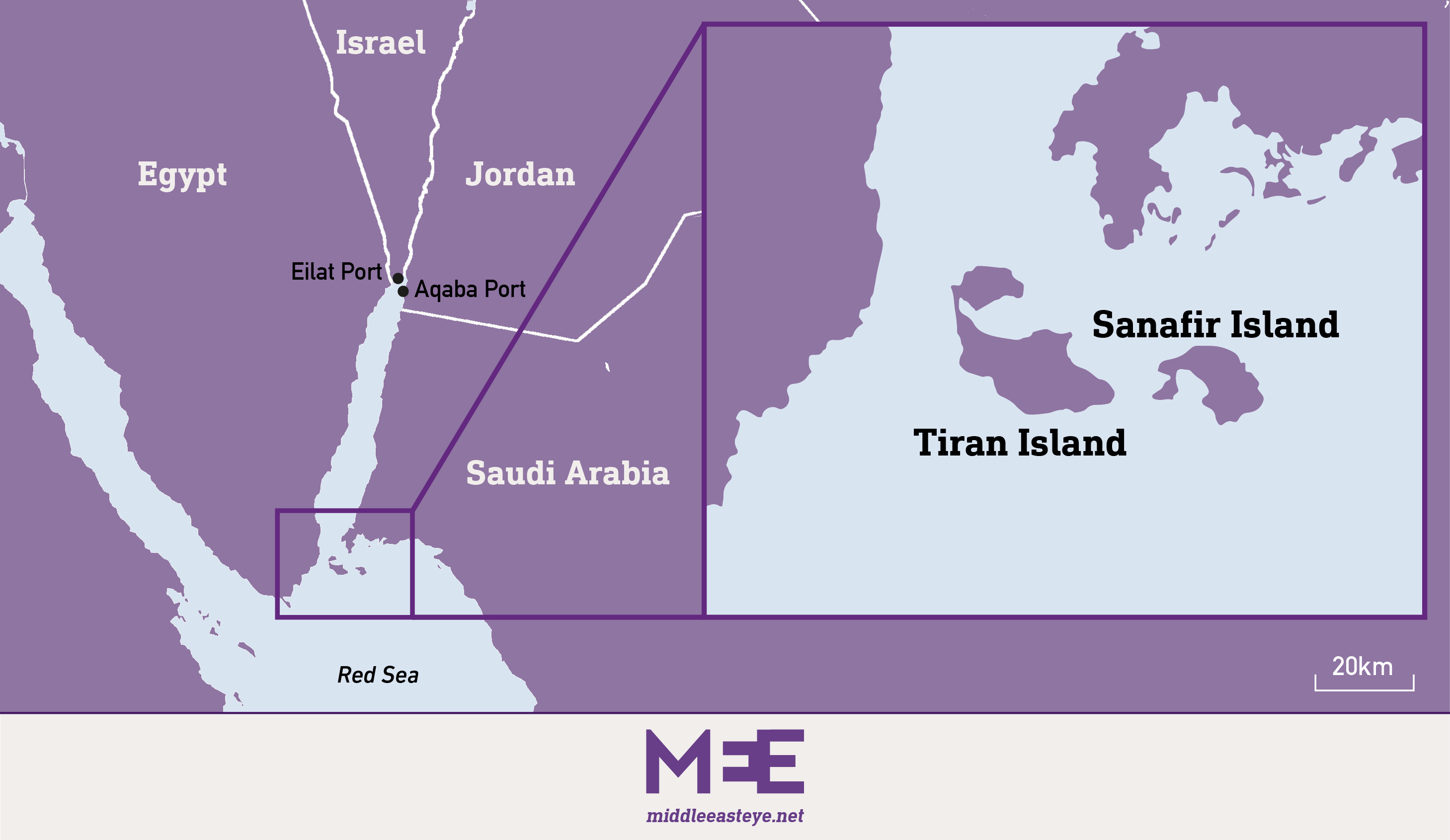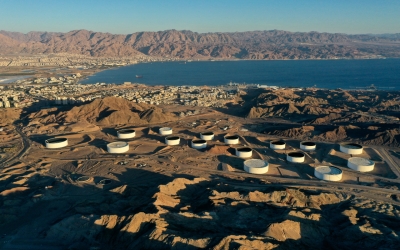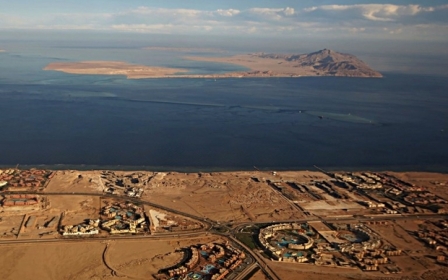Tiran and Sanafir: Why are the Red Sea Islands strategic for Egypt, Saudi Arabia, and Israel?

The Red Sea islands of Tiran and Sanafir have long been a point of contention between Egypt and Saudi Arabia due to their strategic location at the mouth of the Gulf of Aqaba, which holds harbours belonging to the two countries, as well as Israel and Jordan.
As US President Joe Biden heads to Saudi Arabia in the second leg of a trip that started in Israel and the occupied Palestinian territories, one of the issues on the agenda is the status of the two uninhabited Islands.
Egypt and Saudi Arabia have laid claim to the territories since the mid-20th century, and for most of that time they have been in practice administered by Egypt. Although the islands were occupied by Israel in 1967, before being handed back to Egyptian control in 1982 when the two sides signed the Camp David peace accords.
But Egyptian President Abdel Fattah el-Sisi signed an order in 2016 ceding the islands officially to Saudi Arabia.
Now, Israeli officials have reportedly approved the transfer of the islands to Saudi Arabia, removing a stumbling block in the deal, which could also see the kingdom recognising the state of Israel.
New MEE newsletter: Jerusalem Dispatch
Sign up to get the latest insights and analysis on Israel-Palestine, alongside Turkey Unpacked and other MEE newsletters
With all this going on, Middle East Eye takes a look at the significance and history of the dispute:
Why are the islands important?
The islands have been the home of a small multinational peacekeeping force since 1979 following a peace deal between Egypt and Israel. The 61 square kilometre Tiran also hosts an airport, used by the troops.
Tiran, and its smaller eastern nieghbour Sanafir, are positioned at the entrance to the Gulf of Aqaba, the location of Israel's Eilat harbour and Jordan's Aqaba, the only port the kingdom largely land-locked country owns.
Egyptian President Gamal Abdel Nasser's closure of the Strait of Tiran in 1967 cut off maritime access to the two seaports.
Therefore, maintaining the islands' demilitarised status has been seen as a crucial pillar for peace in the region.
Since the 1979 peace agreement and the withdrawal of Israeli troops from the islands three years later, Cairo has also been prevented from hosting troops there as part of the wider Sinai demilitarisation agreement.
Saudi Arabia has promised it will maintain their demilitarised status after taking ownership and will allow Israeli vessels to travel freely in the waters surrounding them.
The 1979 agreement stipulates, however, that any change in the status of the islands' requires Israeli approval.
How did it start?
The dispute over ownership of the islands arguably dates back over 100 years.
In 1906 the Ottoman Empire drew up its eastern borders and placed Tiran and Sanafir - located at the southern entrance to the Gulf of Aqaba - outside of Egyptian territority.
Later that year, Egypt (then officially part of the Ottoman Empire but largely autonomous) signed another agreement which did include the two islands.
Over the next few decades, the Ottoman Empire collapsed and its territory was largely seized by the British, their Arab allies, and the Kingdom of Saudi Arabia, which was proclaimed in 1932.
In 1949, the first war between the newly established State of Israel and neighbouring Arab states took place. This eventually ended in the Rhodes Armistice Agreement that handed sovereignty of the Red Sea islands to Egypt.
However, according to documents cited by the Egyptian government in 2016, Saudi Arabia disputed the ownership of the islands, but - due to the weakness of the Saudi navy at the time - came to an agreement with Egypt that the country would continue to administer them (without ceding their fundamental claim to ownership).
Further disputes would arise in the following decade and a half, with Saudi Arabia appealing to the UN over the islands' sovereignty and Egypt (by that time run by the republican nationalist Gamal Abdel Nasser) citing the 1906 decree by the Ottomans as proof of their right to the islands.
Nevertheless, the islands would continue to be administered by Egypt and used as key strategic, trade, and military assets, until 1967.
That year they were seized by Israel in the war with Egypt and would remain under Israeli control until 1982, when they were handed back along with the Sinai Peninsula as part of the 1979 peace deal.
How did it escalate?
In 2016, three years after Sisi overthrew Egyptian President Mohamed Morsi in a military coup, he signed a maritime demarcation agreement with Saudi Arabia ceding control of the islands of Tiran and Sanafir to the Gulf kingdom.
Saudi Arabia was a key supporter of Sisi's coup and plunged billions of dollars into the country's economy in its wake.
The new agreement, signed in April 2016 provoked widespread anger and was soon challenged in the Egyptian courts, which struck it down.
Thousands took to the streets in what were the first major widespread demonstrations in the country since Morsi was ousted in 2013.
Nevertheless, it was later upheld in another court ruling and then approved by parliament in 2017.
Opposition activists denounced the move as "treasonous".
What is happening now?
In 1979, as part of the peace treaty between Israel and Egypt, a multinational force of observers was established to ensured freedom of navigation at the strait.
The removal of the force has been a stumbling block in negotiations, because it required Israel's approval.
Though Israel has signalled its agreement in past, in exchange it wants certain guarantees and also to increase security cooperation with Saudi Arabia.
Coming in the wake of the 2020 Abraham Accords - which saw Israel normalise relations with UAE and Bahrain - and other normalisation deals, this could be the first step on the road to Saudi Arabia recognising Israel.
On Thursday, Israeli officials told Axios they had given the green light for the Tiran and Sanafir islands deal to the US.
They said the parameters of the deal over the two islands, which the US has been quietly negotiating for months and was previously reported in June, were approved by the Israeli prime minister's office, as well as the foreign and defence ministries.
The deal will also allow for a separate agreement with Saudi Arabia to allow Israeli planes to use the kingdom's air space for eastbound flights to India and China.
US President Joe Biden, who is set to attend a regional summit of Arab leaders in the Saudi Arabian port city of Jeddah, said during a news conference in Israel that he was now "optimistic" about normalisation between Saudi Arabia and Israel.
Middle East Eye delivers independent and unrivalled coverage and analysis of the Middle East, North Africa and beyond. To learn more about republishing this content and the associated fees, please fill out this form. More about MEE can be found here.






